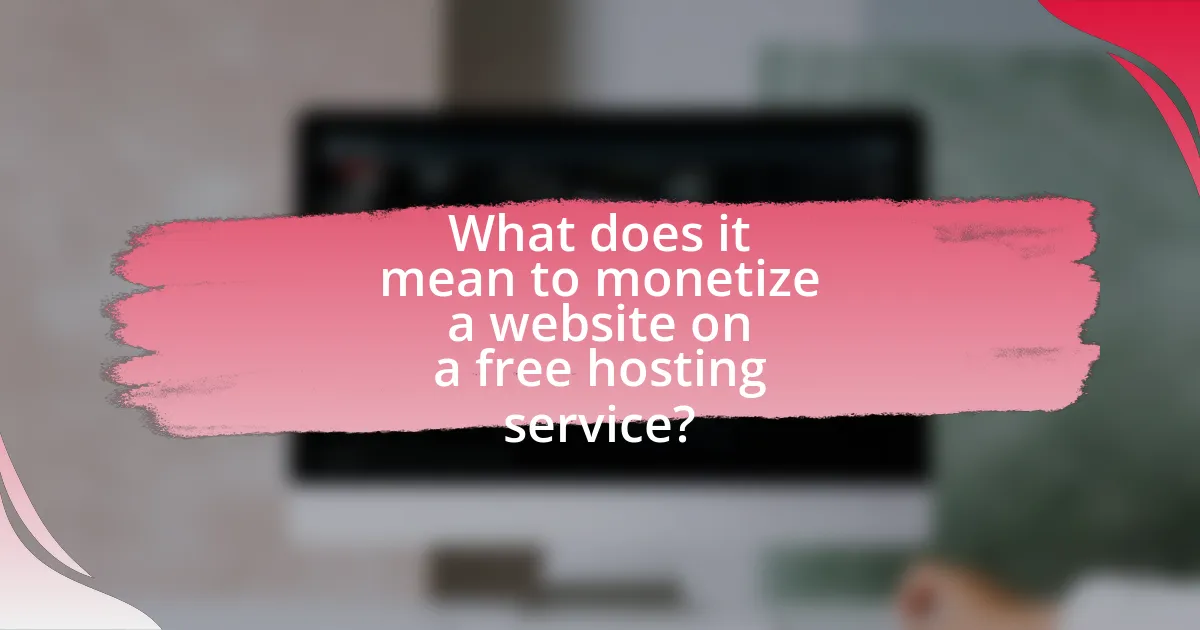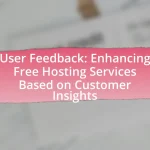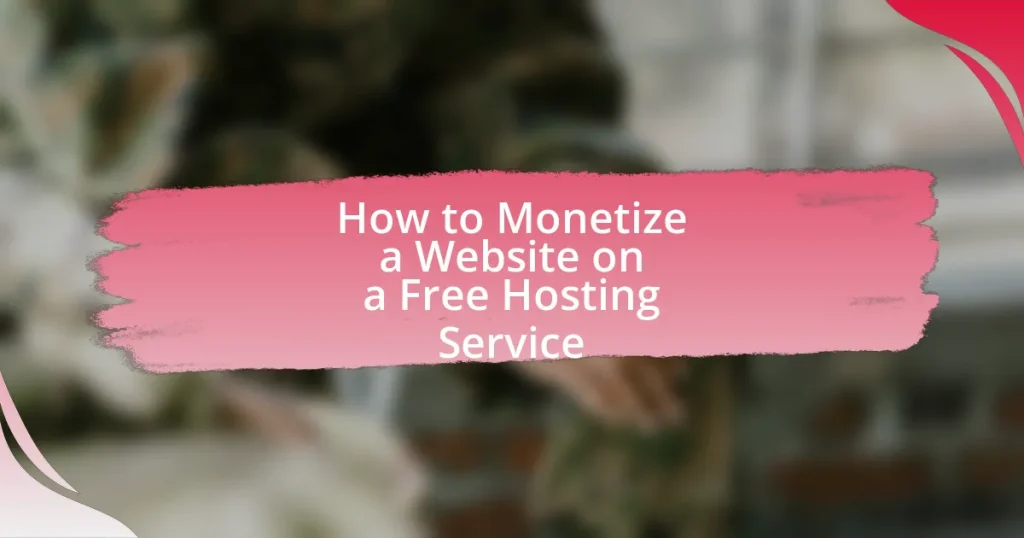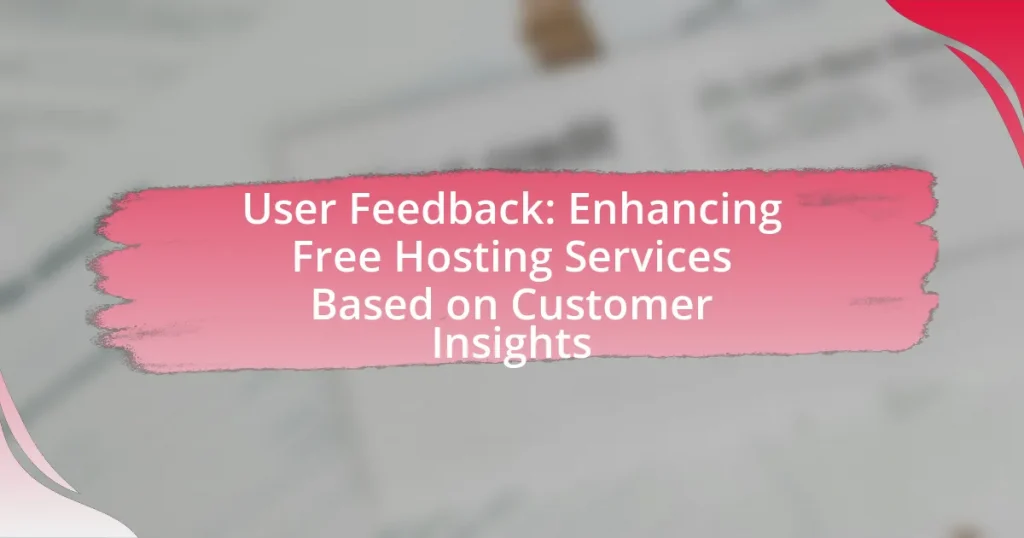Monetizing a website on a free hosting service involves generating revenue without incurring hosting costs, utilizing methods such as advertising, affiliate marketing, and selling digital products. Key monetization strategies include leveraging ad networks like Google AdSense, engaging in affiliate marketing, and creating high-quality content to attract traffic. However, website owners face challenges such as limitations on customization, bandwidth, and control, which can hinder revenue potential. Effective practices for maximizing income include optimizing ad placements, enhancing user experience, and utilizing social media for promotion. Understanding the risks and compliance requirements associated with free hosting is crucial for sustaining long-term monetization success.

What does it mean to monetize a website on a free hosting service?
Monetizing a website on a free hosting service means generating revenue from the website while using a hosting platform that does not charge fees. This can involve strategies such as displaying advertisements, affiliate marketing, or selling digital products. For example, Google AdSense allows website owners to earn money by displaying ads relevant to their content, even on free hosting platforms. According to a report by Statista, the global digital advertising market was valued at over $400 billion in 2021, highlighting the potential for revenue generation through online ads.
How can a website generate income without paid hosting?
A website can generate income without paid hosting by utilizing advertising networks, affiliate marketing, and selling digital products or services. Advertising networks, such as Google AdSense, allow website owners to display ads and earn revenue based on clicks or impressions. Affiliate marketing enables website owners to promote products or services and earn commissions on sales generated through their referral links. Additionally, selling digital products, such as e-books or online courses, can provide a direct income stream. These methods have been successfully employed by numerous websites hosted on free platforms, demonstrating their viability for generating revenue without incurring hosting costs.
What are the common monetization methods available for free-hosted websites?
Common monetization methods for free-hosted websites include advertising, affiliate marketing, sponsored content, and donations. Advertising typically involves displaying ads through networks like Google AdSense, which pays website owners based on clicks or impressions. Affiliate marketing allows website owners to earn commissions by promoting products or services and linking to them. Sponsored content involves partnering with brands to create content that promotes their products, often for a fee. Donations can be solicited from visitors through platforms like Patreon, enabling users to support the website financially. These methods are widely used due to their accessibility and potential for generating revenue without upfront costs.
How does the choice of free hosting affect monetization strategies?
The choice of free hosting significantly limits monetization strategies due to restrictions on advertising, branding, and control over the website. Free hosting services often impose limitations such as displaying their own ads, which can reduce revenue potential for the website owner. Additionally, these platforms may restrict the use of custom domain names, making it difficult to establish a professional brand identity that attracts advertisers. Furthermore, free hosting typically offers limited bandwidth and storage, which can hinder traffic growth and user engagement, both critical factors for successful monetization. According to a study by HostingAdvice, 70% of users prefer websites with custom domains, indicating that free hosting can negatively impact user trust and, consequently, monetization opportunities.
What challenges do website owners face when monetizing on free hosting?
Website owners face several challenges when monetizing on free hosting, primarily due to limitations in resources and control. Free hosting services often impose restrictions on bandwidth, storage, and customization, which can hinder the implementation of effective monetization strategies such as advertising or e-commerce. For instance, many free hosting platforms do not allow the integration of third-party ads or may display their own ads, reducing potential revenue for the website owner. Additionally, the lack of a professional domain name can undermine credibility and trust, making it difficult to attract paying customers or advertisers. Security issues are also prevalent, as free hosting services may not provide adequate protection against data breaches, further deterring potential monetization opportunities.
How do limitations of free hosting impact revenue generation?
Limitations of free hosting significantly hinder revenue generation by restricting website performance, customization, and monetization options. Free hosting services often impose bandwidth limits, which can lead to slow loading times and downtime, negatively affecting user experience and search engine rankings. Additionally, these services typically do not allow for custom domain names, which can diminish brand credibility and trust among potential customers. Furthermore, free hosting often restricts the use of advertisements or affiliate links, limiting the primary revenue streams for website owners. According to a study by HostingAdvice, 70% of users prefer websites with custom domains, indicating that the lack of such features on free hosting platforms can directly impact traffic and, consequently, revenue.
What are the risks associated with using free hosting for monetization?
Using free hosting for monetization poses several risks, including limited control over content, potential for service interruptions, and lack of customer support. Limited control means that hosting providers may impose restrictions on advertising or monetization methods, which can hinder revenue generation. Service interruptions can occur due to the provider’s unstable infrastructure, leading to downtime that affects user experience and revenue. Additionally, the absence of reliable customer support can complicate resolving technical issues, further jeopardizing monetization efforts. These factors collectively increase the vulnerability of a monetized website hosted on a free platform, making it less sustainable in the long term.

What are the most effective monetization strategies for free-hosted websites?
The most effective monetization strategies for free-hosted websites include affiliate marketing, ad networks, and selling digital products. Affiliate marketing allows website owners to earn commissions by promoting products or services, with platforms like Amazon Associates providing easy access to a wide range of products. Ad networks, such as Google AdSense, enable website owners to display ads and earn revenue based on clicks or impressions, making it a straightforward way to generate income. Selling digital products, such as e-books or online courses, can also be lucrative, as it requires minimal overhead and can cater to niche audiences. These strategies are validated by the fact that many successful free-hosted websites utilize them to generate significant revenue, demonstrating their effectiveness in monetization.
How can affiliate marketing be utilized on a free hosting service?
Affiliate marketing can be utilized on a free hosting service by integrating affiliate links within the website’s content, such as blog posts or product reviews. This approach allows website owners to earn commissions on sales generated through those links without incurring hosting costs. For instance, platforms like WordPress.com or Wix offer free hosting options where users can create content and embed affiliate links from programs like Amazon Associates or ShareASale. According to a report by Statista, affiliate marketing spending in the U.S. is projected to reach $8.2 billion by 2022, indicating a growing opportunity for monetization through this method.
What are the best practices for implementing affiliate links?
The best practices for implementing affiliate links include ensuring transparency, optimizing placement, and regularly monitoring performance. Transparency involves clearly disclosing affiliate relationships to maintain trust with the audience, as studies show that 70% of consumers prefer brands that are honest about their affiliations. Optimizing placement means strategically positioning affiliate links within relevant content to enhance visibility and click-through rates, which can increase conversion rates significantly. Regularly monitoring performance through analytics tools allows for adjustments based on data, ensuring that the affiliate strategy remains effective and aligned with audience interests.
How can website content be optimized for affiliate marketing success?
Website content can be optimized for affiliate marketing success by focusing on high-quality, relevant content that engages the target audience and incorporates strategic keywords. High-quality content attracts visitors and encourages them to click on affiliate links, while relevant keywords improve search engine visibility, driving organic traffic. According to a study by HubSpot, companies that prioritize blogging are 13 times more likely to achieve a positive ROI, demonstrating the effectiveness of content in affiliate marketing. Additionally, using clear calls-to-action and optimizing for mobile devices enhances user experience, further increasing conversion rates.
What role do advertisements play in monetizing a free-hosted website?
Advertisements serve as a primary revenue source for monetizing a free-hosted website. By displaying ads, website owners can earn income through various models such as pay-per-click (PPC) or cost-per-impression (CPM), allowing them to generate funds without charging users. For instance, Google AdSense enables website owners to earn money by placing targeted ads on their sites, with reports indicating that websites can earn between $0.10 to $5.00 per click, depending on the niche and traffic volume. This financial model incentivizes website owners to attract more visitors, as higher traffic typically leads to increased ad impressions and clicks, thereby enhancing overall revenue potential.
Which ad networks are suitable for free hosting platforms?
Ad networks suitable for free hosting platforms include Google AdSense, Media.net, and PropellerAds. Google AdSense is widely recognized for its ease of integration and extensive reach, allowing publishers to earn revenue through contextual ads. Media.net, powered by Yahoo and Bing, offers high-quality ads and is particularly effective for content-driven sites. PropellerAds provides a variety of ad formats, including pop-unders and push notifications, making it versatile for different types of content. These networks are compatible with free hosting services, enabling users to monetize their websites effectively.
How can website owners maximize ad revenue on free hosting?
Website owners can maximize ad revenue on free hosting by strategically placing ads in high-visibility areas and optimizing ad formats for user engagement. High-visibility placements include above-the-fold sections and within content where users are likely to interact. Additionally, using responsive ad formats ensures that ads display well on various devices, increasing click-through rates. According to a study by Google, ads placed in prominent positions can lead to a 200% increase in engagement compared to less visible placements. Furthermore, website owners should analyze traffic data to identify peak visitor times and adjust ad placements accordingly, ensuring maximum exposure during high-traffic periods.

How can content creation enhance monetization efforts on free hosting?
Content creation enhances monetization efforts on free hosting by attracting a larger audience and increasing engagement. High-quality, relevant content draws visitors, which can lead to higher traffic and potential ad revenue. For instance, websites with engaging blog posts or videos can see a significant increase in page views; according to a HubSpot report, companies that prioritize blogging are 13 times more likely to achieve a positive ROI. Additionally, consistent content creation can improve search engine rankings, making the site more discoverable. This increased visibility can lead to more affiliate marketing opportunities, as brands are more likely to partner with sites that have a strong content presence.
What types of content are most effective for driving traffic and revenue?
High-quality blog posts, videos, and infographics are the most effective types of content for driving traffic and revenue. Blog posts that provide valuable information and insights can attract organic search traffic, while videos engage users and increase time spent on the site, leading to higher conversion rates. Infographics simplify complex information, making it shareable and appealing on social media platforms. According to HubSpot, companies that prioritize blogging are 13 times more likely to see a positive ROI, demonstrating the effectiveness of these content types in generating revenue.
How can SEO strategies improve visibility for free-hosted websites?
SEO strategies can significantly improve visibility for free-hosted websites by optimizing content, enhancing user experience, and increasing organic traffic. By implementing keyword research, website structure optimization, and quality backlinks, free-hosted websites can rank higher in search engine results. For instance, a study by Moz indicates that websites with optimized content can see a 14.6% conversion rate compared to 1.7% for outbound leads, demonstrating the effectiveness of SEO in attracting visitors. Additionally, utilizing on-page SEO techniques, such as meta tags and alt text for images, can further enhance visibility, making it easier for search engines to index the site.
What content formats engage users and encourage monetization?
Video content formats engage users and encourage monetization effectively. Research indicates that video content can increase user engagement by up to 80% and is more likely to be shared across social media platforms, leading to higher visibility and potential revenue streams. Additionally, interactive content formats, such as quizzes and polls, also drive user participation and can enhance monetization opportunities through targeted advertising and affiliate marketing. According to a study by HubSpot, interactive content generates twice the engagement of static content, making it a valuable format for monetization strategies.
How can social media be leveraged to boost website monetization?
Social media can be leveraged to boost website monetization by driving targeted traffic to the website, increasing brand visibility, and enhancing user engagement. By sharing valuable content and promotions on platforms like Facebook, Instagram, and Twitter, website owners can attract users who are more likely to convert into paying customers. For instance, a study by Hootsuite found that social media marketing can increase website traffic by up to 50%, which directly correlates with higher monetization opportunities through ads, affiliate marketing, or product sales. Additionally, utilizing social media analytics allows website owners to refine their strategies based on user behavior, further optimizing monetization efforts.
What platforms are most effective for promoting free-hosted websites?
Social media platforms such as Facebook, Twitter, and Instagram are most effective for promoting free-hosted websites. These platforms have large user bases, allowing for extensive reach and engagement. For instance, Facebook has over 2.8 billion monthly active users, providing a vast audience for content sharing and promotion. Additionally, utilizing platforms like Reddit and Pinterest can drive targeted traffic, as they cater to specific interests and communities. According to a study by HubSpot, social media marketing can increase website traffic by up to 122%, demonstrating its effectiveness in promoting online content.
How can social media engagement translate into revenue?
Social media engagement can translate into revenue by driving traffic to a website, increasing brand awareness, and fostering customer loyalty. When users interact with content on social media, they are more likely to visit the associated website, which can lead to higher conversion rates. For instance, a study by HubSpot found that companies with active social media engagement experience 24% more revenue growth than those without. Additionally, engaged users are more likely to make purchases, as they develop trust and familiarity with the brand through consistent interaction. This trust can lead to repeat business and referrals, further enhancing revenue potential.
What are the best practices for maintaining a monetized website on free hosting?
To maintain a monetized website on free hosting, prioritize optimizing site performance and user experience. This includes regularly updating content to keep it relevant, ensuring fast loading times by minimizing image sizes and using efficient coding practices, and implementing responsive design for mobile users. Additionally, utilize SEO strategies to enhance visibility, such as keyword optimization and backlinking, which can drive traffic and increase ad revenue.
Monitoring analytics is crucial; tools like Google Analytics can provide insights into user behavior, allowing for data-driven adjustments to improve engagement and monetization strategies. Lastly, be aware of the limitations of free hosting services, such as bandwidth restrictions and potential downtime, and consider upgrading to a paid plan if traffic increases significantly, as this can enhance reliability and support higher revenue potential.
How can website owners ensure compliance with hosting service policies?
Website owners can ensure compliance with hosting service policies by thoroughly reviewing and understanding the terms of service provided by their hosting provider. This involves reading the policies related to acceptable use, content restrictions, and monetization practices. For instance, many free hosting services prohibit certain types of content or advertising methods, and violating these terms can lead to account suspension or termination. Additionally, website owners should regularly monitor updates to these policies, as hosting providers may change their terms. By adhering to these guidelines, website owners can maintain compliance and avoid potential penalties.
What strategies can help sustain long-term monetization success?
To sustain long-term monetization success, website owners should focus on diversifying revenue streams, optimizing user experience, and leveraging data analytics. Diversifying revenue streams, such as incorporating affiliate marketing, ad placements, and premium content, reduces reliance on a single income source and increases overall revenue potential. Optimizing user experience through responsive design and fast loading times enhances user engagement, leading to higher retention rates and increased monetization opportunities. Leveraging data analytics allows website owners to understand user behavior, enabling targeted marketing strategies that can improve conversion rates and maximize revenue. These strategies are supported by industry studies indicating that diversified income sources and enhanced user engagement significantly contribute to sustained monetization success.















